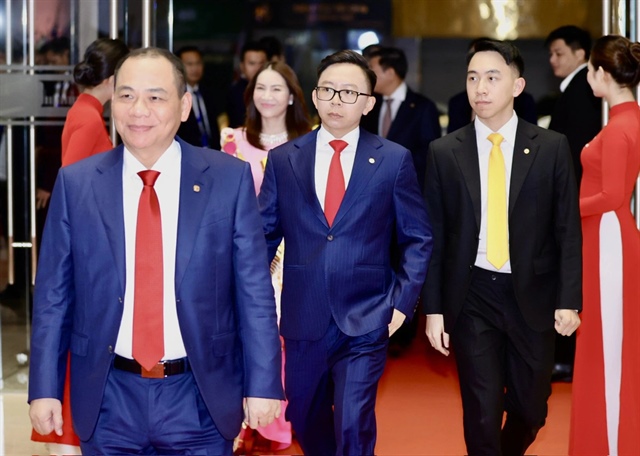APEC discusses transparency in trade negotiations, informing civil society
APEC discusses transparency in trade negotiations, informing civil society
There is a lack of information about policy in trade negotiations in some countries and territories, and experience shows that many would like to have a voice in the process, an APEC workshop heard.

The Committee on Trade and Investment held a workshop on strengthening transparency and participation in the process of negotiation of trade agreements in HCM City on Sunday within the framework of the third Senior Officials Meeting (SOM 3) and related meetings.
Speaking at the workshop, moderator Filipe Lopeandia, head of the TPP Department and OECD Department at the Chilean Ministry of Foreign Affairs, said: “This worshop directly focuses on a general debate on how different economies are conducting their trade negotiations and how they are communicating the content of their negotiations to their civil society, and how to establish channels of communication between the governments in charge of trade negotiations and civil society.
“We think the debate raised in the workshop would be very interesting, very meaningful in order to address part of the criticism civil society expressed … complaining about lack of information, about those negotiations.
“To address the criticism the economies would exchange experiences on how they have dealt with civil society during their own trade negotiations.”
He described Viet Nam as a “completely integrated economy in trade.”
“The country has much experience in negotiating many trade agreements. I think it would be interesting to find out how Viet Nam develops channels of communication with civil society about negotiations.”
Speaking to Viet Nam News, he said: “We can [make] some recommedations on that issue. But if not, to have this debate with people with expertise in this issue, I think this APEC workshop would be enriching to listen about those experiences. Just the idea to sit together to exchange experiences is a good outcome in that regard.
Julia Nielson, head of the development division at the Trade and Agriculture Directorate, OECD, said: “In the American context, the concern is not about the impact of trade on jobs and on household incomes. In Europe we often see much more of a concern about the impact of trade on standards … on global competition and whether countries can maintain these standards.
“But even if there are differences in who’s unhappy and when people are unhappy and why, the problem is that unhappiness with trade in one country is everybody’s problem, not just because trading is global, but because … if your trading partner has a problem with their domestic constituency it is your problem as well.”
But cutting off trade would not be the answer, she emphasised.
“Firstly, protecting trade doesn’t help grow income households. Secondly, in the global economy and global value chain, cutting off imports is self-defeating. Imports are inputs for your own domestic production and your own exports, so that means imports increase domestic jobs and imports also contain your previous exports.
“And lastly the argument we pointed out is that protection does not actually help workers, we see that across many developed countries, manufacturing jobs have declined.”
Delegates discussed various perspectives on the current criticisms and mistrust regarding trade and its benefits and possible relationship with the lack of information, engagement, the complexity of the technical contents of trade agreements and the challenges to achieving more transparent and participatory trade agreements.
Officials and experts from APEC member economies on Sunday continued with their busy schedules as nine meetings were held within the framework of the third Senior Officials Meeting (SOM 3) and related meetings.
Experts continued to discuss issues related to the automotive industry, anti-corruption and transparency, electronic commerce, illegal logging and associated trade.
Good regulatory practices discussed
On the same day, the Sub-Committee on Customs Procedures and Sub-Committee on Standards and Conformance (SCSC) organised its 10th conference on good regulatory practices (GRPs) with the participation of more than 100 officials from APEC economies and independent experts.
The conference discussed expanding the application of GRPs as a tool to reduce trade barriers, promote investment and boost economic growth.
The conference shared the 2016 update on GRPs in APEC economies, especially those areas where greater work is warranted.
At the two-day conference there have been several interesting sessions focusing on issues of specific concern to economies, including those specifically mentioned in the Renewed APEC Agenda for Structural Reform (RAAS) such as notice and comment procedures, well-written drafts and mechanisms for incorporating public comments.
The conference discussed and shared best practices in the implementation of WTO obligations related to notifications and inquiry points.
Vu Thi Tu Quyen, deputy director of the Directorate for Standards Metrology and Quality’s international co-operation department, said, “The GRPs conference contributed to raising awareness of the importance of GRPs to trade and investment and showcased the best practices in GRP in the APEC region.
“The application of GRP principles such as transparency, consultation and regulatory review is sufficiently widespread to provide a basis for collective actions by APEC in further creating a favourable regulatory environment to boost global trade and investment and ensure sustained economic growth in the APEC region.”
Quyen told Viet Nam News that Viet Nam had delivered a speech on its experiences and practices.
Others like the US, Australia and New Zealand also shared their experiences.
The conference on GRPs used to be biennial until 2015 and annual since.





















